- Part Of
- Jewish Community Centre of Toronto fonds
- Executive director series
- Financial reports sub-series
- Level
- File
- ID
- Fonds 61; Series 1-2; File 10
- Source
- Archival Descriptions
- Part Of
- Jewish Community Centre of Toronto fonds
- Executive director series
- Financial reports sub-series
- Level
- File
- Fonds
- 61
- Series
- 1-2
- File
- 10
- Material Format
- textual record
- Physical Description
- 1 folder of textual records
- Scope and Content
- This file contains one report created for the YMHA.
- Accession Number
- 2004-5-2
- Source
- Archival Descriptions
- Part Of
- Zionist Organization of Canada fonds
- National Administrative Council and Executive Board series
- National Treasurer sub-series
- Auditor's reports sub-sub-series
- Level
- File
- ID
- Fonds 28; Series 1-3-1; File 17
- Source
- Archival Descriptions
- Part Of
- Zionist Organization of Canada fonds
- National Administrative Council and Executive Board series
- National Treasurer sub-series
- Auditor's reports sub-sub-series
- Level
- File
- Fonds
- 28
- Series
- 1-3-1
- File
- 17
- Material Format
- textual record
- Date
- 1946
- Physical Description
- 1 folder of textual records
- Scope and Content
- The file consists of the Auditor's Report and financial statements consisting of the balance sheet, statements of income and expenditure and sundry schedules created by Richter, Usher & Co., Chartered Accountants.
- Source
- Archival Descriptions
- Address
- 322 Spadina Avenue
- Source
- Landmarks
Opened in 1946 when the neighbourhood was still teaming with Jews working and living in the neighbourhood, this deli was one of the last to close in the area, in 1946. The Switzer family lived at 35 Nassau Street.
- Address
- 322 Spadina Avenue
- Time Period
- 1946-1991
- Scope Note
- Opened in 1946 when the neighbourhood was still teaming with Jews working and living in the neighbourhood, this deli was one of the last to close in the area, in 1946. The Switzer family lived at 35 Nassau Street.
- Category
- Food-related business
- Source
- Landmarks
- Address
- Camperdown
- Source
- Landmarks
Established in 1930, Camp Camperdown was founded in Orillia by the National Council of Jewish Women as an extension to their long-running Jewish Girls’ Club that provided athletic, cultural and vocational programs to working and school age girls in the city. At Camp Camperdown, girls were provided with even greater opportunities to discover and develop their talents and capabilities. By the late 1930s, the camp moved to the Collingwood area and it closed in the mid-1940s.
- Address
- Camperdown
- Time Period
- 1930-ca. 1946
- Scope Note
- Established in 1930, Camp Camperdown was founded in Orillia by the National Council of Jewish Women as an extension to their long-running Jewish Girls’ Club that provided athletic, cultural and vocational programs to working and school age girls in the city. At Camp Camperdown, girls were provided with even greater opportunities to discover and develop their talents and capabilities. By the late 1930s, the camp moved to the Collingwood area and it closed in the mid-1940s.
- History
- The guiding principle to involve campers in the decision-making process at Camp Camperdown proved highly effective. In 1946, an administrative report described, “The children keep very busy. But the things they do are the things they WANT to do, and activities that they plan, they plan together with their counselors.”
- Category
- Camps and Resorts
- Source
- Landmarks
- Address
- 9 Brunswick Avenue
- Source
- Landmarks
The Toronto Hebrew Religious School was established in 1907 to provide children with a Jewish education based on non-denominational, Zionist, and traditional Torah values. The school’s curriculum focused on the importance of the Jewish community and people (klal yisrael), as well as the responsibilities and privileges that being a Canadian citizen entailed. Being a staunchly Zionistic institution, all lessons were taught in Hebrew (ivrit bi ivrit). Originally situated on Simcoe Street, the school moved to its Brunswick Avenue location in 1925, and was known from then on as the Toronto Hebrew Free School and more informally as the Brunswick Avenue Talmud Torah. The building was designed by Jewish architect, Benjamin Brown.
- Address
- 9 Brunswick Avenue
- Time Period
- 1925-1946
- Scope Note
- The Toronto Hebrew Religious School was established in 1907 to provide children with a Jewish education based on non-denominational, Zionist, and traditional Torah values. The school’s curriculum focused on the importance of the Jewish community and people (klal yisrael), as well as the responsibilities and privileges that being a Canadian citizen entailed. Being a staunchly Zionistic institution, all lessons were taught in Hebrew (ivrit bi ivrit). Originally situated on Simcoe Street, the school moved to its Brunswick Avenue location in 1925, and was known from then on as the Toronto Hebrew Free School and more informally as the Brunswick Avenue Talmud Torah. The building was designed by Jewish architect, Benjamin Brown.
- History
- In 1946 the school became known officially as the Associated Hebrew Schools of Toronto. Having started initially as an afternoon and weekend school, in the 1940s the school began offering a full day program with its’ first grade 8 day school class graduating in 1951. From the Brunswick location, Associated branched out, and opened up branches further north, eventually establishing campuses on Finch Ave. and Neptune, where the schools are currently located.
- Category
- Education
- Source
- Landmarks
- Address
- 52 East Fox Lake Rd.
- Source
- Landmarks
Established in 1933, Camp Winnebagoe was the first Jewish co-educational camp in Canada, owned and operated by Joe and Sadie Danson. First located on the Rouge River, just east of Toronto, the camp moved to a number of different lakeside locations in the Huntsville area, during its long history. In 1971, Camp Winnebagoe purchased Camp Ogama on Fox Lake and it has been there since, operated by the Lustig family. The camp’s programming includes secular and Jewish traditions including themed days, events honouring individual campers’ outstanding contributions and Friday Night Services.
- Address
- 52 East Fox Lake Rd.
- Time Period
- 1933-present
- Scope Note
- Established in 1933, Camp Winnebagoe was the first Jewish co-educational camp in Canada, owned and operated by Joe and Sadie Danson. First located on the Rouge River, just east of Toronto, the camp moved to a number of different lakeside locations in the Huntsville area, during its long history. In 1971, Camp Winnebagoe purchased Camp Ogama on Fox Lake and it has been there since, operated by the Lustig family. The camp’s programming includes secular and Jewish traditions including themed days, events honouring individual campers’ outstanding contributions and Friday Night Services.
- History
- In 1946, David Lieberman founded Camp Ogama, a private a co-educational overnight camp for children aged 6-16, on Fox Lake near Huntsville. It was touted to be “Canada’s most progressive camp for young Jewish boys and girls.” The socially conscience programming offered at Camp Ogama had a profound impact on counselors and campers alike producing highly influential alumni. Former camper journalist Earl Pomerantz reflects, “Camp inoculated us with a passion for justice. And it wasn’t write a check and see you later; this was money where your mouth is.”
- Category
- Camps and Resorts
- Source
- Landmarks
- Part Of
- Dr. A. I. Willinsky fonds
- Level
- Item
- Fonds
- 81
- Item
- 8
- Material Format
- moving images
- Date
- Mar. 1946
- Physical Description
- 1 film reel (ca. 65 min.) : 18 fps, col., si. ; 16 mm
- 1 magnetic track : sound track ; 16 mm
- 1 digi-beta cassette (ca. 65 min.) : master, digital, col., si.
- 1 DVD (ca. 65 min.) : duplicate, digital, col, si.
- Scope and Content
- Item is a film production of Dr. and Mrs. Willinsky's trip to Lima, Peru to attend the 5th International Assembly of the International College of Surgeons. Footage of assembly delegates, landmarks and the local population are interspersed with captions added by Dr. Willinsky. Included are scenes of assembly delegates near Lima's Workman's Hospital, Sadie visiting the home of the assembly's chairman and entering the palace of Peru's president for a luncheon, sights along the streets of San Martin, cathedrals, shots taken from a moving train, and images of the Ricmac River from a nearby road.
- Notes
- Previously reels # 43 and 60
- Places
- Peru
- Source
- Archival Descriptions
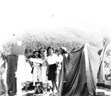
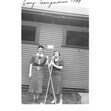
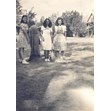
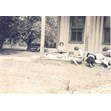
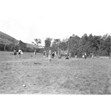
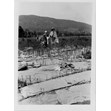

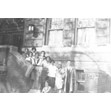
![Y.M.-Y.W.H.A. teen dance at Brunswick Avenue Talmud Torah, [ca. 1950]. Ontario Jewish Archives, Blankenstein Family Heritage Centre, fonds 61, series 6, item 18.|](/media/Digital Assets/61-JCC/F61_s6_i018.jpg?width=111&height=111&404=no-img.jpg)
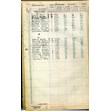
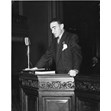
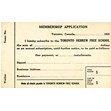
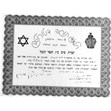
![Drawing of the Brunswick Avenue Talmud Torah by architect Benjamin Brown, [ca. 1922]. Ontario Jewish Archives, Blankenstein Family Heritage Centre, fonds 49, series 1, file 3|Benjamin Brown (1890-1974) was the first practicing Jewish architect in Toronto. After completing his high school equivalency, he enrolled in the University of Toronto architectural program, graduating in 1913. Soon after, Brown opened up a practice with fellow architect Robert McConnell, which lasted until the early 1920s. After the partnership ended, Brown set up an independent practice, which he maintained until his retirement in 1955.|Brown's most important commissions include the Beth Jacob Synagogue located on Henry Street, which was one the largest synagogues in Toronto, and the Balfour Building, an office tower built in the Art Deco style. The designs of Mendel Granatstein’s mansion, which contained a retractable roof for Sukkoth, and a colour sketch of the Primrose Club, which is currently the University of Toronto Faculty Club, may also be of interest to researchers. The fonds also includes some of Brown's files containing articles and illustrations from architecture and design journals of the early twentieth century, which he used as a resource to assist him with his work.](/media/Digital Assets/49-Brown/F49_s1_f3.jpg?width=111&height=111&404=no-img.jpg)
